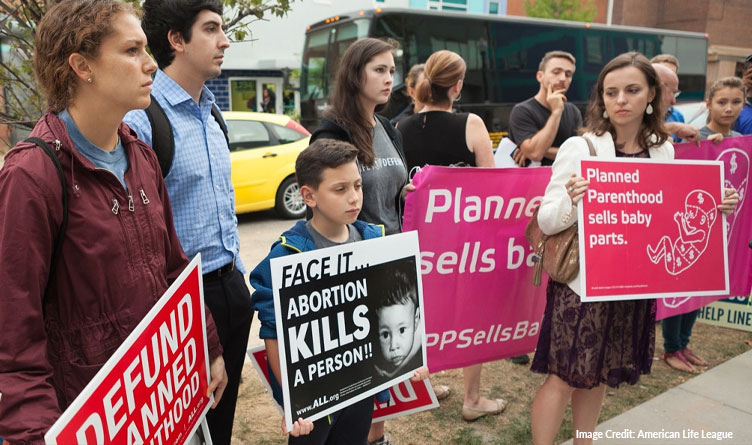Image Credit: American Life League
By Andrew Crapuchettes –
According to a 2020 Gallup poll, nearly one in four Americans considers abortion a key voting issue.
Given this commitment to abortion “rights” or abortion restrictions, the potential overturn of Roe v. Wade, and the lesser known Planned Parenthood v. Casey, could dramatically impact business, particularly through the labor market.
Over the last two years, many conservative voters have left more liberal cities and states looking for the freedom afforded them in conservative regions. As part of this de-urbanization of America, the three states with the most outbound migration from April 1, 2020, to July 1, 2021 have been to California, New York, and Illinois. Combined, over a million residents have left these states alone, and many more from other states with Democrat governors. That migration has been mostly to states with Republican governors, the top three being Florida, Texas, and Arkansas.
For one-issue voters, state policy may further drive talent from or attract talent to their local economies. Dr. Bridget Nelson, creator of the massive Facebook group “Conservatives Moving to Texas,” has said that abortion is one of the biggest issues under consideration for those choosing to relocate. Apparently, people don’t really appreciate their state tax dollars being used to pay for abortion services through Medicaid as in Minnesota, California, Washington, and others. According to the latest data available from Planned Parenthood’s research arm, “[s]tates spent $71 million on about 157,000 abortion procedures for low-income women in FY 2015.”
*** Click Here to Support Conservative Journalism in Tennessee. We can’t bring you great Editorials like this without your support!***
If Roe is overturned, 26 states will automatically restrict abortion, and 13 of those have passed “trigger bans,” which will be automatic if abortion laws return to the states. One such trigger law in Tennessee would ban abortion from conception forward, 30 days after Roe is overturned, and allow for felony charges against doctors who commit abortions.
Many abortion advocates have appealed to convenience in the last month: because the economy and inflation are so bad, women need to be able to choose whether and when to have a family so they can get ahead in the workforce. They need to be in charge of how many mouths they have to feed. Rep. Greg Stanton (D-Ariz.) recently asked, “[H]as anything done more to help women gain their footing in the workplace and advance professional careers?” Some businesses have agreed with this, including Nike, Apple, and Citigroup Bank, by offering to pay for employees to procure abortions in abortion-friendly states. Using this logic, liberal work environments might expect to attract female candidates who want support for their lifestyle choices.
On the other side of the equation, conservative businesses look back over the last 50 years and see the loss of life and its catastrophic impact on the labor market. The simple fact of the matter is that since 1973, we have been short 63 million Americans who could have participated in the workforce.
In a time of an extreme labor shortage, with almost two unfilled jobs for every available worker and a sinking labor force participation rate, the American economy could benefit from millions more workers. As American life has become more polarized, those Americans who have fought to overturn Roe v. Wade will be more likely to move to regions where abortions are restricted and work in companies that support their beliefs. They will be attracted to businesses that encourage employees to join cost-sharing health care options that refuse to pay for abortions.
For those businesses engaged in long-term planning, states that have pro-life laws will see more children born. In the first five months of the Texas law restricting abortions, supporters estimate that 15,000 babies were saved. Over time, the economic effects of these additional births will be drastic. Businesses should plan for their future talent strategies. If they want to connect with a mission-aligned workforce, then they should know where to find talent, possibly moving their operations to states where policies align with the cultural orientation of the workforce concentration. Abortion policy considerations should weigh heavily into consideration.
“The Big Sort” is already underway, and the toppling of Roe and Casey will kick this migration into high gear. Millions of American voters will migrate from one state to another due to state policies. Millions more will be born over the course of the coming decade. To stay relevant in a historically tight labor market, businesses will need to know where to find the right kind of talent. Businesses that are prepared to welcome freedom migrants will reap benefits for decades, and the generations who will naturally come with them.
About the Author: Andrew Crapuchettes is the founder and CEO of RedBalloon, which was founded in 2021 as the solution to the ever-growing problem of government overreach and “cancel culture” invading the American workplace.




